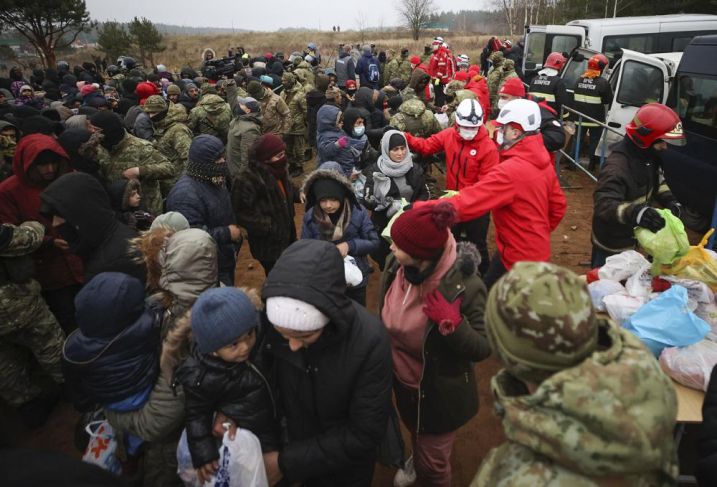This is the last in a series of articles on one of the major challenges facing us globally.
Last week I wrote about how the local and multinational private sector can work with citizens of developing countries to create the jobs and train the people to participate in the global economy by empowering them to earn a living at home rather than to be forced to migrate in search of a better life.
This can benefit many people who otherwise live peacefully in their home countries.
But what of those 26 million refugees worldwide whose lives have been threatened by repressive governments, violent gangs, narco- and political terrorism? Private sector investment in their home countries alone cannot alleviate the root causes of their migration, nor can it guarantee their safety and lives.
Refugee movements create a series of problems for recipient countries that must also be addressed.
First, the citizens of the recipient countries must be sensitized to the fact that these refugees face life or death situations and cannot return to their homes. In many cases, neighboring developing countries lack the resources or infrastructure to settle them. Developed countries have the resources. What they must do to replace fear or animosity towards refugees is to develop policies to ensure that citizens feel that they too are equitably treated while the government assists refugees and that the policies encourage rapid refugee settlement, integration and contribution to the local economy and society.
Creating a sense of humanity, fairness and hope for all is the way to replace fear and jealousy. The best way to achieve this is through thoughtful policies and civic education from a very young age.
Extremist populist leaders and politicians are known to use immigration as a political tool to instill fear among their followers as we have seen in the United States, Hungary, Holland, France, the United Kingdom, and other places. Moderate leaders and politicians need to develop policies with a long-term view and demonstrate a degree of fairness and balance between being our brother’s keeper and ensuring that all citizens feel fairly treated relative to those that are being helped. While civilized societies must not abandon those suffering persecution and facing certain death, building a sense of community and equitable treatment for all can contribute to greater acceptance and social stability during a time of crisis.
Second, with an eye towards building community, refugees must also be made to understand that part of the deal involves their integrating into their new society. This means that they must adapt to the receiving culture (not the other way around), learn the language, and leave behind some of their cultural baggage as they begin a new life in a new country.
Being a stranger in a strange land is not an option.
Displaced people must accept that their reality demands change and adaptation. They should not expect to change the culture of the receiving society to meet their cultural or religious requirements. This requires the active participation of receiving governments and societies in order to create bridges with migrants and give them tools, a sense of acceptance and opportunity and a timeframe to learn about and adapt to their new countries of residence.
All of this requires time in order to achieve the needed change of mentalities in the countries affected. How do we achieve these two goals?
One way to achieve this is to create groups in each country made up of former refugees who have successfully resettled business owners, citizens and legislators from all sides of the political spectrum to develop realistic programs and policies that can guide all to a smooth adaptation to their new reality. Reception committees at their point of entry should include both citizens and previous refugees who share the refugees’ language and culture to receive them in their own language and ease their way into their new reality.
Governments alone cannot do this, but they must lead the way.
They must involve the public as a full partner in developing the long-term education and immigration policies that will achieve a sense of inclusiveness and openness that can facilitate a smooth transition for all. The private sector can also contribute training and education programs to accept refugees and prepare them to integrate into society and fill available jobs. Since most developed countries today face a crisis of diminishing numbers of young workers to sustain increasingly older populations, training and acclimatizing refugees cannot only help them but also help make a long-term contribution to the society.
It won’t be easy in this interlinked yet polarized world, where many citizens of developed countries may not value the benefits of short-term sacrifices for long-term gains. But it is the responsibility of leaders to develop the structures to implement the polices to achieve this goal.
Absent this change of mentalities, millions will be condemned to suffer torture, imprisonment, or certain death, or a lifetime of living in infrahuman conditions in refugee camps.
Can moral societies condone this?
Keep reading: Migration II
Edición: Laura Espejo
La premiada, de origen tzotzil, se ha dedicado a la defensa de los derechos humanos de niñas y mujeres
La Jornada
El diputado Jiménez Gutiérrez propuso otorgar facultades a los ayuntamientos para rehabilitar clínicas comunitarias
Jairo Magaña
Segob trabaja una serie de eventos para visibilizar a las mujeres
Jairo Magaña
Estos edificios albergan valiosos equipos informáticos que pueden representar un objetivo bélico
Afp
